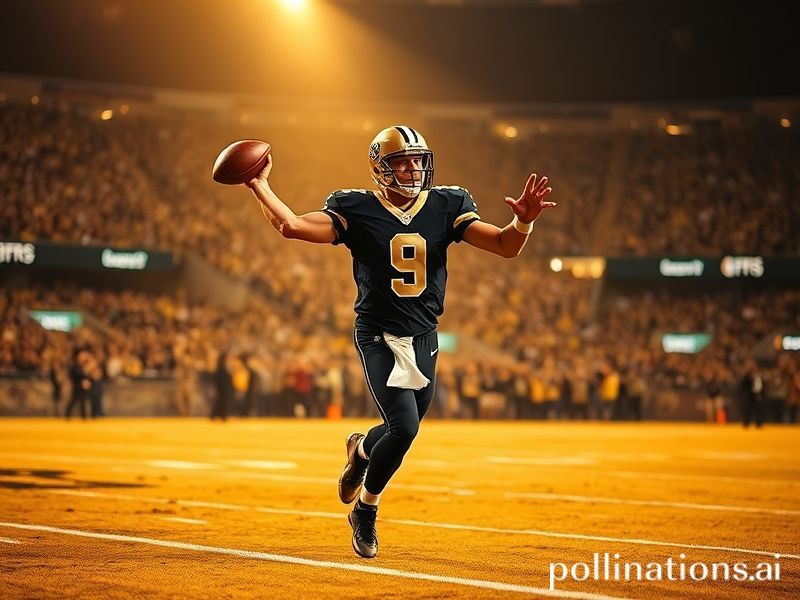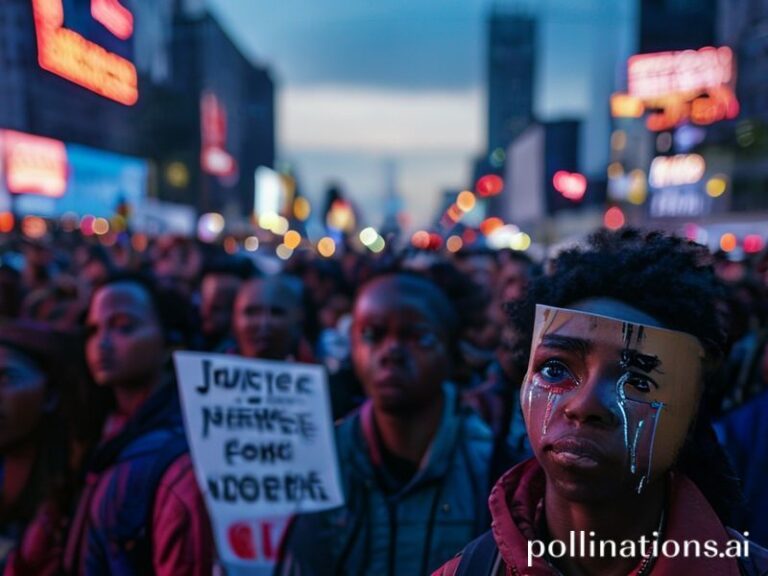From Lagos to Liechtenstein: How Drew Brees Became the World’s Accidental Soft-Power Quarterback
Drew Brees and the Global Art of Turning a Spiral into Soft Power
By Our Paris Bureau Chief, nursing a 2005 Bordeaux and a mild case of existential dread
PARIS—Somewhere between the pâté and the second bottle of Burgundy, it dawned on the assembled diplomats, hedge-fund escapees, and one very confused Senegalese rapper that the man on the terrace television was no longer throwing touchdowns so much as exporting ideology. Drew Brees—once merely the undersized quarterback who resurrected a drowned city and then a moribund franchise—has, in retirement, become a peculiar kind of trans-Atlantic ambassador: part folk hero, part cautionary tale, and wholly symptomatic of America’s uncanny ability to weaponize pop culture in places that still can’t reliably keep the lights on.
Consider last month’s impromptu clinic in Lagos. While Nigeria’s electrical grid performed its usual disappearing act, a diesel generator coughed to life long enough for 300 teenagers to watch Brees demonstrate footwork drills in an abandoned basketball court now doubling as a soccer pitch. The kids wore Arsenal jerseys, Barcelona scarves, and—because irony is the last renewable resource—one vintage Chargers jersey that had outlived three owners. They chanted “O-B-J! O-B-J!” at a man who never threw him a pass, proving that global branding is nine-tenths mispronunciation.
Europe, of course, pretends not to care. The continent that gifted the world both the Enlightenment and the offside rule has long regarded American football as rugby for people who need a spreadsheet and a nap. Yet L’Équipe still splashed Brees across page three last week beneath the headline “Le Génie des Statistiques Impossibles,” because nothing sells newspapers like a Yank who can convert third-and-long and third-world despair into the same metric. Meanwhile, in a Berlin bar that screens Kansas City games at 3:00 a.m., philosophy majors argue whether Brees’s pre-snap cadence constitutes Dadaist poetry or late-capitalist death rattle. The answer, naturally, is yes.
Asia has adopted a more transactional posture. In Shenzhen, a factory already mass-produces “Brees9” smartphone cases despite the fact that the NFL’s Chinese streaming deal imploded faster than a crypto exchange run by philosophy majors. The cases outsell the league’s official merchandise three to one, demonstrating that in the global marketplace you don’t need intellectual property when you have plausible deniability. Somewhere, Roger Goodell is Googling “Cease and Desist” in Mandarin while a Tencent intern explains what a meme is.
The Middle East prefers its prophets with a side of geopolitical intrigue. Saudi Arabia’s new sports-investment fund floated the idea—half rumor, half hallucination—of luring Brees to coach a four-team flag-football league staged in a climate-controlled dome the size of Liechtenstein. The league’s motto: “Friday Is the New Sunday.” When asked, Brees chuckled, quoted scripture, and pivoted to talking about his children’s charity, thereby demonstrating the precise diplomatic agility currently missing from every actual embassy.
And then there is the American heartland, where Brees’s every post-retirement sneeze is parsed like papal smoke. His recent NBC departure—framed as a quest for “family time” and “entrepreneurial opportunities”—sparked a thousand podcasts debating whether he was pushed, pulled, or simply realized that reading a teleprompter for Peacock subscribers is less glamorous than being sacked by 280-pound debt instruments. Midwestern callers rang in to declare the whole saga “typical coastal elite nonsense,” apparently unaware that Brees’s last name is literally pronounced like a stiff breeze, not a French cheese.
So what does it all mean, this planetary orbit around a 44-year-old man who no longer throws footballs for money? Simply that in an era when trust in institutions curdles faster than milk in Mumbai traffic, the world still craves a narrative uncomplicated by tariffs, variants, or algorithmic rage. Drew Brees—saint, sellout, or both—offers the illusion that excellence can be apolitical, that a tight spiral might still cut through the smog of discourse. It’s nonsense, of course, but it’s the kind of nonsense that sells jerseys, phone cases, and hope by the metric ton.
At closing time, the Lagos generator finally dies. The screen goes black mid-drill, leaving 300 teenagers in darkness, chanting a name they can’t quite pronounce for a sport they’ve never played. Somewhere, a marketer updates a spreadsheet: “Brand penetration: 300 impressions, zero electricity.” The world keeps spinning, slightly off-axis, but still spiraling—just the way Brees drew it up.







